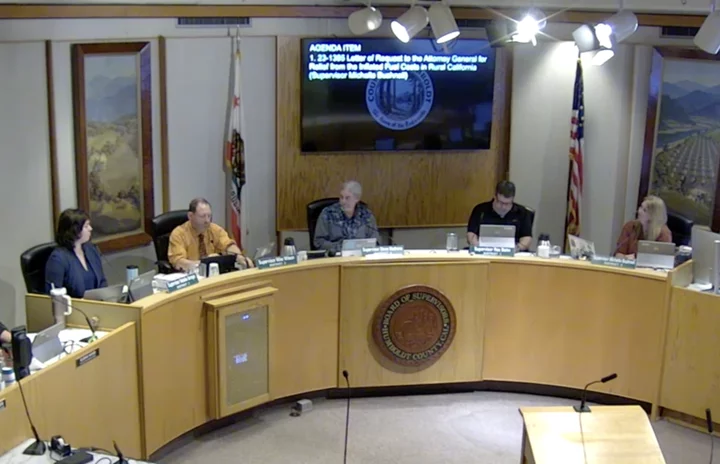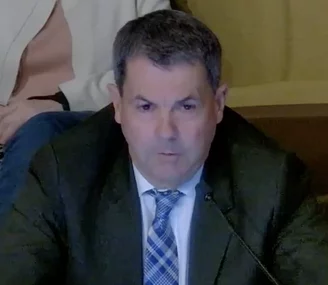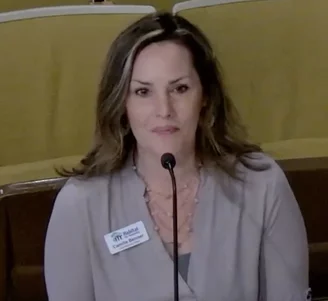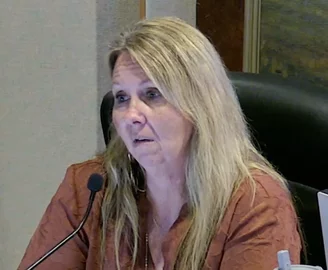Screenshot of Tuesday’s Humboldt County Board of Supervisors meeting.
###
During Tuesday’s meeting, the Humboldt County Board of Supervisors approved a somewhat controversial request from staff to redraft the Humboldt Region Climate Action Plan (CAP) to ensure the environmental document complies with state requirements.
Rincon Associates, the consulting firm hired to complete the environmental review of the document, has encountered numerous issues with the draft CAP in recent months and has found the plan to be “overly ambitious” with goals that “cannot be achieved” in the next seven years.
The CAP must set realistic goals to reduce greenhouse gas (GHG) emissions by 2030, in accordance with California’s ambitious climate action policy, and outline how the county and its partner jurisdictions will achieve those goals, otherwise, the document will not “qualify” with the state.
Rincon drew up a proposal with several proposed modifications that would qualify the document. The proposed changes would, in part, update the county’s GHG inventory and target analysis. “Rincon will work with the jurisdictions to identify targets that are practical, defensible, and consistent with current state legislation, including SB 32 and the newly signed AB 1279,” the proposal states. “Rincon will produce both per capita and mass emission-based targets for the review.”
The proposal also seeks to revise the county’s GHG reduction measure and actions for “successful implementation.”
Some environmental advocacy groups feel the proposed changes would weaken the document have called on the county to do more to ensure accountability.
At the end of last month, a coalition of environmental advocacy groups issued a press release accusing city and county planners of employing a harmful and dishonest “accounting trick” in the process of developing the regional CAP. The coalition argued that proposed changes to the draft document would sidestep meaningful action to reduce GHG emissions by taking credit for reduction targets it has already met.
Speaking during Tuesday’s meeting, Planning and Building Director John Ford acknowledged that there has been “some opposition” to staff’s approach, but said, “It is vitally important to adopt an adequate [CAP] that is qualified and can be defended.”
“We’re not undertaking this approach to achieve something that is unnecessary but rather to put all the jurisdictions in the county in a place to have a plan that allows us to effectively adapt to climate change,” Ford said. “Looking ahead, the CAP alone is not sufficient. … I just would point out that the county is currently looking at developing a Climate Resiliency Officer [position] as a step to accomplish this important implementation.”
The proposed changes will take four to six months to complete, according to Rincon’s proposal. The problem is, the grant funding the county has obtained to pay for the draft CAP is only available til March of 2024, Ford said.
To accommodate the tight timeframe, Ford requested that the board allow staff to utilize grant funding through the Humboldt County Association of Governments (HCOAG) for the revision of the CAP, rather than preparation of the Environmental Impact Report (EIR) as previously intended.
“Revisions to the draft [and] all the work contained within the Rincon proposal would need to be accomplished by that date,” he said. “Coming right on the heels of that, we would begin preparation of the [EIR]. The preparation of the document should be complete by September of 2024. Public review would occur in October of 2024. The final EIR would be complete by the end of the year, with public hearings on the CAP beginning in January 2025.”
Ford added that staff would try to expedite the process when appropriate.
Speaking during public comment, Luis Neuner, an advocate with the Environmental Protection Information Center (EPIC), emphasized the importance of having an environmental document “with some degree of teeth in it” to ensure we meet our GHG reduction goals.
“It would be irresponsible for us not to just pass something soon,” he said. “Implementation will be hard. It will be harder than getting this thing approved, and that means that we can’t wait much longer. A hard date by which we can get things rolling needs to be a serious part of the conversation if we are real about meeting our 2030 goals.”
Caroline Griffith, executive director of the North Coast Environmental Center agreed, emphasizing the importance of having “actionable items … that will actually reduce our emissions.”
“We know that there’s a deadline for this reworking but we also have to go to the EIR process,” Griffith said. “It would be great to have an adoption deadline. Also … as technology changes, as methodology changes, as funding sources change, it will be really important to have staff who are actually working solely on this to make sure that we can implement it and that there is coordination happening between municipalities and that there are funding sources for all of this.”
Arcata resident John Schafer said the problem with the county’s draft CAP is not that it’s too ambitious, but rather that it does not include “specifics for carrying out any of the necessary policies.”
“We shouldn’t be shy about demanding more ambitious climate policies,” he said. “It’s not just sea level rise or our grandchildren that we should do this for, but because it’ll lead to a healthier economy. We need a sensible business plan if we’re going to prosper in Humboldt County. … The existing plan is indeed inadequate because it doesn’t have suitable policies. It needs to be stronger.”
Going back to the board for discussion, Third District Supervisor Mike Wilson expressed his support for staff’s recommendation to modify the CAP, adding that the proposed plan “is only one piece” of the local effort to combat climate change.
“I also want to remind ourselves that … Humboldt County was the vanguard of the development of solar power,” Wilson said. “In the 1980s, the second largest consumer of solar panels in the United States – next to the U.S. military – was Southern Humboldt and Northern Mendocino counties. … I think, in general, we actually have a populace that may help us in moving forward [on our climate goals]. That doesn’t mean that we don’t put things in writing … but I think we’re gonna see some opportunities around that.”
Wilson made a motion to approve staff’s recommendation, which was seconded by Fourth District Supervisor Natalie Arroyo.
Before voting on the matter, Arroyo suggested the board create a climate action ad hoc committee. County Counsel Scott Miles said the action should be brought forth at a future date rather than being wrapped into the motion.
The board passed the motion in a 5-0 vote.
Earthquake Recovery Efforts in Rio Dell
It’s been ten months since a magnitude 6.4 earthquake hit Humboldt County. In that time, communities throughout the Eel River Valley, namely Rio Dell, have struggled to obtain disaster relief funding needed to get low-income residents back into their homes, largely due to the tedious application process.
Second District Supervisor Michelle Bushnell requested a status update on earthquake recovery efforts from Habitat for Humanity, the entity leading disaster recovery assistance, to get a better idea of when funding would be dispersed.
“There hasn’t been any money that’s gone out to constituents for repairs and we’re coming up on a year … [since] the earthquake happened,” Bushnell said. “[I]t’s very frustrating for people that aren’t in their homes and are struggling through the process. … I know the application process is difficult, but the message I’m getting from constituents is ‘I’m done. I can’t do this anymore. I’m gonna do this myself.’ They feel left behind.”
Back in January, the Board of Supervisors authorized staff to create a locally funded Earthquake Recovery & Assistance Program with $1 million from the county’s allocation from the federal Local Assistance and Tribal Consistency Fund (LATCF). The board awarded $250,000 of those funds to Habitat for Humanity to provide support and disaster recovery assistance to the county and its partners.
Camille Benner, administrative officer for Habitat for Humanity Yuba/Sutter, acknowledged that the application process is “very, very difficult” but said her team is doing its best to guide people through the process.
“We don’t make those rules and regulations,” she said, noting that the applications are subject to rules outlined by the U.S. Department of Agriculture (USDA). “We’re following the same process even with your funding because it protects us, it protects you and it protects the homeowners. … [The] initial disaster response is handling those initial needs, getting food, getting people placed into hotels if they’ve lost shelter, supplies, etc. Long-term recovery is, on average, two to five years, sometimes significantly longer.”
Because the earthquake was not declared a federal disaster, there are “significant limitations” on what disaster case managers can provide, Rio Dell City Manager Kyle Knopp added.
“Most of the other funding streams are really designed for other purposes, [such as] anti-poverty program funding,” Knopp said. “We have a lot of different programs that we need to make sure that all the T’s are crossed, all the I’s are dotted before individual applicants move forward in the process. I understand the frustration. It’s extremely frustrating to go through these long processes to access resources … .”
Bushnell said she was trying to be understanding of the process but reiterated that “no money has gone out the door and no repairs have been made.’
“I have constituents calling me upset and they’re crying,” she said. “That’s hard for me. And I’m not trying to be critical of you folks … [but] I haven’t gotten any updates.”
John Nicoletti, deputy director of Habitat for Humanity Yuba/Sutter, noted that Habitat for Humanity changed its approach in an attempt to expedite the application process. Originally, their team was working with low-income renters affected by the disaster. They pivoted to work directly with property owners.
“We’re asking that they honor the agreement for affordable housing … to ensure that if public funds are being expended, they are meant to benefit the tenant in the end,” Nicoletti said. “Where it begins to concern someone like me is when we’re moving from a $16,000 repair or a $40,000 repair and all of a sudden … the estimates that we have from contractors exceed the value of the house. … Should we spend $200,000 on a house, basically replacing it, or can we take that $200,000 and move it into five different properties?”
Fifth District Supervisor and Board Chair Steve Madrone and Wilson both spoke in favor of using the funds to house as many people as possible “rather than to large projects that might eat up a whole lot of money,” Madrone said.
Following public comment and a bit of additional discussion from the board, Arroyo made a motion to accept and file the report. Bohn seconded the action. The motion passed in a 3-0 vote, with Bushnell and Wilson absent due to a previously scheduled meeting with state Sen. Mike McGuire.
Relief for Fuel Costs
The board also considered a request, brought forth by Bushnell, to send a letter to California Attorney General Rob Bonta seeking financial relief from inflated fuel costs which, according to county staff, average about $6.49 per gallon locally.
“I get a lot of calls from constituents about the price of gas in Humboldt County compared to other counties in California,” Bushnell explained. “Additionally, I have gotten some calls from some distributors that pick up in Oakland and bring [fuel] into Humboldt County and I was struggling to figure out how to address [the issue] or how or who to address that with. … So, I’m just wanting to have the discussion and see where possibly we could go with this.”
Earlier this year, Gov. Gavin Newsom signed legislation to combat gas price gouging in California by increasing oversight. The first-in-the-nation law, enacted in June, established the Division of Petroleum Market Oversight, a division within the California Energy Commission to monitor the industry. The new law requires oil companies to submit daily reports on the market and imports, as well as monthly reports on refiners’ profit margins.
Wilson acknowledged that the law’s intent was focused on price gouging that occurred during the COVID-19 pandemic rather than stabilization of current fuel prices but suggested that it could address Bushnell’s constituents’ concerns.
“I think for me, the focus really is about the exploitation of our population, of our working folks and everybody else who’s not, as I would say, on the upper echelons of society,” Wilson said. “We need more equalization and stabilization of pricing and across the board. This is just this one finite element.”
After a bit of discussion among board members, Bushnell said she’d be fine with holding off on the letter for the time being. “I’m happy to not send the letter,” she said. “However, I do want to address my constituents, and it is a big concern.”
Bushnell made a motion to table the discussion, which was seconded by Wilson. The motion passed 5-0.
###
Other notable bits from the meeting:
- The board also reviewed revised implementation guidelines for Measure V, an action approved by Humboldt County voters in 2016 to regulate rent increases in mobile home parks in unincorporated areas of the county. The proposed implementation guidelines sought to clarify
the original guidelineshow the ordinance would be enforced and answer questions that have arisen in the last six years. During Tuesday’s discussion, supporters of Measure V said county staff had not given them proper notice of the discussion and urged the board to oppose staff’s recommendation. Staff maintained that the county had properly noticed the public and stood behind the proposed guidelines. After quite a bit of discussion and a confusing motion, the board decided not tochangeadopt the guidelines and directed staff to come back with a progress report in one year. - The board also received a presentation on the audit for Fiscal Year 2020-21. Rich Gonzalez, a representative of CliftoLarsonAllen LLP, detailed the findings of the audit. All told, “the county is moving in the right direction,” Gonzalez said. The board unanimously agreed to receive and file the report.




CLICK TO MANAGE